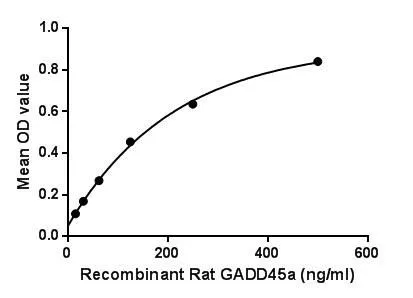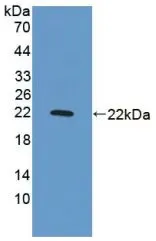
SDS-PAGE analysis of GTX00066-pro Rat GADD45A protein.
Rat GADD45A protein, His tag
GTX00066-PRO
ApplicationsFunctional Assay
Product group Proteins / Signaling Molecules
Protein IDP48317
Overview
- SupplierGeneTex
- Product NameRat GADD45A protein, His tag
- Delivery Days Customer9
- Application Supplier NoteGrowth arrest and DNA-damage-inducible protein GADD45 alpha (GADD45a) is a member of the GADD45 family. It may affect PCNA interaction with some CDK (cell division protein kinase) complexes; stimulates DNA excision repair in vitro and inhibits entry of cells into S phase. In T-cells, functions as a regulator of p38 MAPKs by inhibiting p88 phosphorylation and activity. Besides, Proliferating Cell Nuclear Antigen (PCNA) has been identified as an interactor of GADD45a, thus a binding ELISA assay was conducted to detect the interaction of recombinant rat GADD45a and recombinant rat PCNA. Briefly, GADD45a were diluted serially in PBS, with 0.01% BSA (pH 7.4). Duplicate samples of 100 microl were then transferred to PCNA-coated microtiter wells and incubated for 2h at 37C. Wells were washed with PBST and incubated for 1h with anti-GADD45a pAb, then aspirated and washed 3 times. After incubation with HRP labelled secondary antibody, wells were aspirated and washed 3 times. With the addition of substrate solution, wells were incubated 15-25 minutes at 37C. Finally, add 50 microl stop solution to the wells and read at 450nm immediately. The binding activity of GADD45a and PCNA was in a dose dependent manner.
- ApplicationsFunctional Assay
- CertificationResearch Use Only
- ConjugateUnconjugated
- Gene ID25112
- Target nameGadd45a
- Target descriptiongrowth arrest and DNA-damage-inducible, alpha
- Target synonymsDdit1, Gadd45, growth arrest and DNA damage-inducible protein GADD45 alpha, DDIT-1, DNA damage-inducible transcript 1 protein, DNA-damage-inducible transcript 1, growth arrest and DNA-damage-inducible 45 alpha
- Protein IDP48317
- Protein NameGrowth arrest and DNA damage-inducible protein GADD45 alpha
- Scientific Descriptionmay mediate a delay in G2 to M cell cycle progression; may induce DNA repair [RGD, Feb 2006]
- Storage Instruction-20°C or -80°C,2°C to 8°C
- UNSPSC41116100
- SpeciesRat


